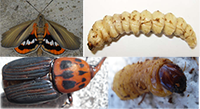|
The main objectives of the project are to conduct a thorough research regarding RPW and P. archon under the Cyprus conditions, with regard to the spread of the insects, the study of their bio-ecology, the determination of RPW molecular characteristics, as well as to propose modern and effective control measures in the framework of an Integrated Pest Management (IPM). The proposed methodology will include basic and applied research under both field and laboratory conditions, emphasizing mostly the bio-ecological and management studies as follows: a) monitoring of these pests throughout the island by conducting visual examinations on all the recorded host and non-host plants of RPW and P. archon, by recording the examined locations with destroyed palms using GPS; b) trapping of RPW using various pheromone traps; c) Study the bio-ecology of RPW according to the quantitative and qualitative analysis of the captured insects and the correlation of their flight activity with the micro-environmental conditions; d) study the local RPW strain, its genetic and phenotype polymorphism and compare it with that of other countries; e) develop an automatic bioacoustic detection system for RPW and P. archon using advanced spectral analysis and machine learning techniques; f) study and promote environmentally friendly control measures against palm pests [focusing on plant sanitary and cultivating measures, use of entomopathogenic fungi, nematodes) and biopesticides etc], as well as environmentally friendly compounds. The direct benefit will be the implementation of a reliable strategic IPM plan, the adoption of which will aim, in a medium-term, to restrict the spread of these species, protecting this way the natural environment of our country.
General objectives of the project
- Protection of host palms which are an integral part of the urban, suburban, and the outdoor natural environment of Cyprus.
- Continuous study of the bio-ecology of RPW and P. archon, development of ‘know-how’, and a national scientific-based IPM programme. Study and implementation of the most effective and environmentally friendly control methods with more emphasis given on the biological method.
- Conservation of the principles for protection of the biodiversity (according to the EU Legislation) as well as the rational and sustainable management of natural resources.
- Development of a collaboration network with specialized research centers and qualified Bodies and Services in Cyprus and abroad, dealing with Plant Sanitary and IPM.
- Improvement of the quality of public life, reinforcement of competitiveness of the Cypriot economy.
- The results of this research project will be disseminated to the wider research and scientific community locally and internationally.
Specific scientific and technological objectives
- Establish a programme for early detection of these palm pests and develop an automatic acoustic recognition system (sound emission) of RPW and P. archon, by employing suitable sensors and supervised classification algorithms.
- Laboratory and field studies on the bio- ecology of these species, under Cyprus conditions; conduct a quantitative and qualitative analysis of the trapped adults in pheromone traps (RPW) (size of the insect, sex ratio etc); correlation of flights according to the various micro environmental conditions, fluctuations and densities of the population.
- Studies on the molecular identification (barcoding) and molecular diversity of RPW (strain, genetic and phenotype polymorphism).
- RPW and P. archon management using: a) non-chemical measures (plant sanitary and cultivating measures, trapping, use of entomopathogenic fungi and nematodes, etc), and b) chemical control (using more or less environmentally friendly compounds).
- Development of an Integrated Pest Management Programme of palm pests which should be applied at local and national level.
|


